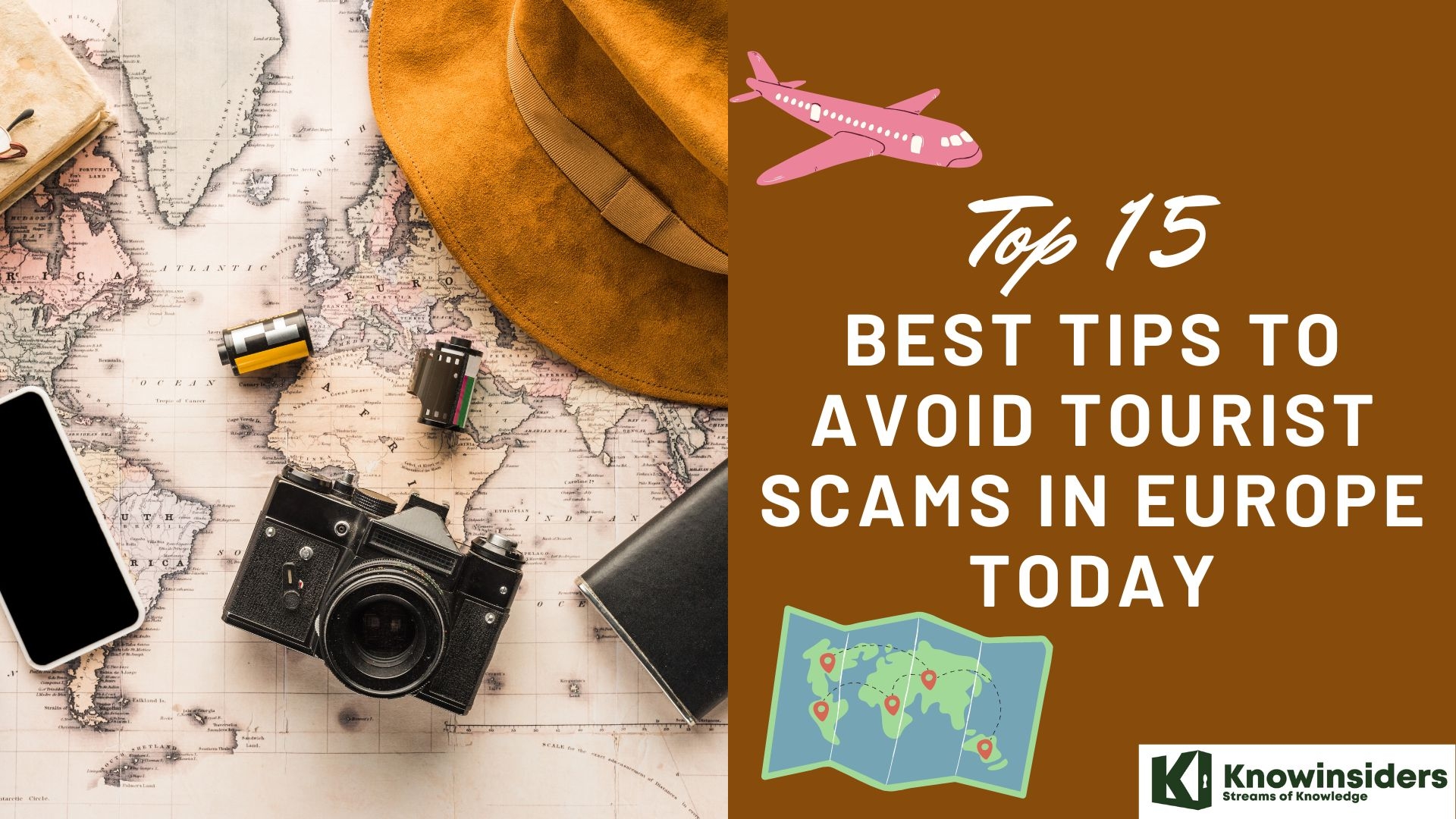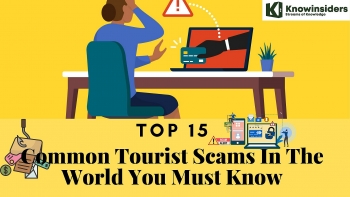15 Pocket Tips to Avoid Tourist Scams in Europe Today
 |
| Top 15 Best Tips to Avoid Tourist Scams in Europe Today Knowinsiders.com |
| Table of Content |
It’s a lot of peoples worst nightmare, and can turn a relaxing vacation or a once in a lifetime trip into an experience you’d rather forget; no, being the victim of a scam is never fun. It’s easier to be tricked while on your travels; there are plenty of people out there who make a living off scamming unsuspecting tourists.
Europe, with its many landmarks and attractions is notoriously bad for these kinds of tricks and traps so here are a few simple steps you can take to minimize the chances of being scammed. You would want to know how to recognize scammers, and how to avoid them.
Here are the 15 best tips to avoid tourist scams and recognize the signs at first hand in Europe today.
Most Common Scams in Europe
 |
| Photo: Search Engine Journal |
The spill that’s not accidental. Pigeon poop — real or fake — or ketchup, ice cream, coffee or something else is spilled on you. Or thrown at you. “Someone will approach you and offer to help clean you up. Another person then picks your pocket while you are distracted,” the State Department warns.
The panhandler’s plastic cup. Some beggars place a clear plastic cup in the path of pedestrians hoping they inadvertently kick over the cup and send coins skittering. The goal: a guilt-tripped donation. “Assume beggars are pickpockets,” European travel expert and TV host Rick Steves has advised.
The fake “gold” ring. A bad actor bends down to pick up a ring, insists it’s yours and lifts your wallet as you inspect it. Or the person demands a finder’s fee for returning the brass trinket.
The spiked drink. More and more complaints have arisen from tourist spots across Poland: Victims have been lured into establishments with the promise of discounts or other enticements and exploited financially while under the influence of intoxicants, according to the Overseas Security Advisory Council, a partnership between the State Department and the private-sector security community. Inflated credit card charges may be difficult to challenge because bars and clubs can show evidence of victims’ consent. The crime happens in many countries and the venue could be, for example, a tea house or restaurant.
The designer watch. Or jacket. Or purse. A well-dressed man in Italy asks for directions, claims to work for a luxury-goods brand and shows you product samples in his car, a warning from the website hotels.com says. As a gift, he hands you a watch, jacket or bag, then pretends he’s almost out of gas and asks for money — more than the knockoff is worth.
The “friendship” bracelet. Bad actors tie string around a tourist’s wrist or finger and braid it into a bracelet, then demand money and threaten the tourist if turned down.
The fake police officer. In city centers and resorts in Spain, some thieves pose as police, approach tourists and ask to see their wallets for identification purposes, the British government warns. If this happens to you, establish that the officers are genuine and if necessary, show some other form of ID. Genuine police officers don’t ask to see wallets or purses.
The phony petition. In tourist enclaves in Paris, young boys and girls, some pretending that they cannot hear or speak, approach with a petition and ask for your signature — and money, French police officials warn. The youths may seem to be acting on behalf of associations and foundations but are not. “Their only aim is to get money from you, which will never be transferred to these organizations but instead used to fund illegal organizations and underground networks,” the officials say.
The crush-and-grab on the subway. Several people swarm you as they try to get on or off a train car and, as they push you, pick your pockets. Another tactic is grabbing the purse of a passenger sitting by the door and hopping off as the doors are closing. Find a seat away from the doors and minimize access to your pockets and purse.
The highway pirates. These thieves wave your vehicle over for assistance with a flat tire or mechanical trouble, but as you help, an accomplice makes off with all the possessions in your unlocked vehicle.
Also, in many parts of Spain, rental cars carry a large sticker on the back of the vehicle, and there have been numerous reports of thieves breaking into rentals and taking all the valuables while they were parked at a scenic overlook or other tourist spot, the Overseas Security Advisory Council says.
Pickpockets. To fish your phone, wallet or cards from your pocket or bag with incredible speed and precision. Pickpocketing is a common problem in most touristy destinations around the world. But pickpockets in Europe are remarkable for one thing — creativity. They usually operate in groups. Oneis the actual pickpocket, another serves as a lookout or hides the item, while the rest block your view, rattle you, or keep your attention away from your valuables.
Photo Scam. In many touristy places throughout the continent, you’ll find people in costume eager to have a photo with you. It can be people in stilts in Venice, gladiators in Rome, or women in full flowery getup in Barcelona. Some will approach you and your instinct is to have a selfie with them. Don’t! Because once you’re done, they’re going to demand payment for it. And they won’t accept coins! Some of them charge for 20 euro per photo, a complete and utter ripoff!
Bar or Club Scam. These scammers use attractive women as bait. They would lure unsuspecting men (often walking alone or in a pair) into a bar or a strip club. Sexy woman then asks you to get her a drink and you’ll probably buy one for yourself too.
Overcharging Restaurants. In some restaurants, while you wait for your actual order, the waiters will serve a couple of dishes and insist that you try them. You might think they’re complimentary. Or if you smell something fishy, so you’ll tell the waiter you don’t want it. But he’s really persistent. You’ll get tired arguing so you’ll probably let them put it on your table and not touch it. But then, even when you’re not done yet, they will serve another dish. And when the bill comes, you’re charged for everything, even those you did not even touch.
Friendship Bracelet Scam or Flower Scam. You’re walking when a man with a bunch of string bracelets in one hand approaches you. He will try to get your attention, most likely by asking you if you want to see a magic trick, by raising a hand for a high-five, or by telling you that he’s giving you a bracelet for free (a GIFT!). Whatever it is, his aim is to wrap a string bracelet around your wrist. The whole thing takes time but they’re sweet talkers. Once you have the bracelet on, he will charge you for it and demand an excessive amount. If you refuse, the other string guys will approach and intimidate you into paying.
 Top 15 Common Tourist Scams In The World Today Top 15 Common Tourist Scams In The World Today Scammers are everywhere, and tourists are the easy targets to fall victims to their crime. Keep scrolling down to learn more about the most common ... |
What are the best tips to avoid being scammed while you are traveling in European countries?
1. Question a Great Deal
When you’re not on vacation and you come across a deal that seems too good to be true, more often than not by looking into the details you find out it is just that. It shouldn’t be any different when you’re away from home. If you’re being offered a deal that seems a bit too fantastic, don’t feel pressured to sign up then and there. Take some time, do your own research and be sure and gather as much information as possible before getting on board.
2. Get to Know the Currency
One of the first things you experience when arriving at a new destination is the currency, and it’s a great idea to take a few minutes to get a feel for the notes and coinage and their respective values. Even doing a bit of research prior to your departure is worthwhile. It’s helpful as, for example, the €2 coin looks very similar to coins worth much less, or even absolutely nothing like the 500 lira coin – the Italian currency prior to the establishment of the Euro. Many cities will also offer currency exchange and in some developing countries, people will be ready to greet you and offer unsanctioned exchanges as soon as you leave the airport so being armed with knowledge of local currency and exchange rates will help keep your money where it belongs.
3. Be Careful Of "The Lost Driver" Asking For Help
Falling into a scam on the road or the street can become too dangerous. You can lose not only your material objects but also your life.
If you travel through Rome, be aware of the following form of scam, which once again has to do with local people acting too friendly.
The man looks neat and well-dressed. He tells you that he is lost and that he needs gasoline. Since you are enjoying his conversation, you consider helping him.
The person will tell you that he is not from that area. Therefore, he got lost. He will also wrap you up in a story about the luxurious products that he sells. The man will take an expensive-looking object out of his car and offer it to you as an act of kindness.
Then the scammer will ask you to lend him money for gas and make sure to let you know how expensive the gift that he gave you was. Basically, to make you feel pressure to lend him some money since you received something luxurious from him.
What innocent travelers don't know at the time is that the object is a cheap imitation and is not worth more than what they have 'lent' to the scammer.
Always use your common sense while traveling. And never receive anything from a stranger, even if the object looks like the most beautiful and expensive watch you have ever seen.
Generally, our guts tell us that someone who is well-dressed and looks nice is not deceitful and should not be feared. Our danger alarm only alerts if the person does not have a good aspect.
But, as you see, even those men dressed in suits are to fear in certain circumstances.
It's always better to have a bit of distrust than blindly trust anyone who can harm you.
4. Be aware of which taxi you will take
Before hailing a taxi, travelers should be aware of the many taxi driver scams they may encounter. Most frequent are the stories about cab drivers who claim the meter is broken and charge a wild rate or meters that run fast and rack up a huge fare. Drivers who hang around airports and hotels are known to overcharge, but it can happen anywhere.
Before getting into a taxi, ask the hotel staff what you should expect to pay for a ride. When getting into the car, ask the driver to turn on the meter first thing to avoid being overcharged. Make sure to only ride in authorized cabs and stay vigilant for red flags that indicate it may be an unlicensed cab trying to dupe tourists.
Also, be wary if your driver tries to tell you that your hotel is overbooked or closed. The driver will then try to take you to a different, more expensive option, where they make a nice commission for dropping you off. This also poses personal safety concerns, as you wind up in a different part of town than you expected. Do not let the driver bring you to the alternate location and insist on going to your original destination.
Fortunately, smartphones and the internet enable travelers to make smarter decisions regarding transportation. Something as simple as pulling up the directions on your phone and guiding your taxi driver can help ensure you keep your trip on track. If you are visiting a location with poor cell reception, preload the maps to your destinations before you leave your hotel for the day.
5. Research Scams
Before you take off it’s worth doing a little research by looking into the latest tourist scams doing the rounds in your destination to find out if con artists in your chosen destination have any favoured tricks. Knowing what to look out for will definitely help you avoid being duped. Some classics around Europe include The Found-a-Ring (where a person will approach with a ring asking if you dropped it, when you say no they will show you that it’s pure gold and try to sell it to you for much more than they actually paid for it), The Friendship Bracelet, and The Lost Salesman, although as travelers catch on and word gets out, new and more creative tricks regularly surface.
6. Do not fall into travel voucher fraud
 |
| Photo: Unsplash |
While travel vouchers are a great option for travelers whose plans were unexpectedly canceled, this new normal is also proving to be a popular option for scammers and criminals to take advantage of.
Exercising skepticism is one of the most powerful tools travelers have for the protection of their vouchers. Anything that seems unusual, unprofessional, or too good to be true probably is, and when in doubt always contact your travel supplier directly.
Use caution when sharing sensitive voucher information and take care not to share it with an unverified source. If you need to contact your travel supplier with a question or request regarding your voucher, be sure you know who you are calling. Scammers have been reported to create fake online sites or listings for a travel supplier, guiding customers to contact this fake phone number or email address directly. If a victim provides their private voucher and contact information, the criminal can steal the information they have collected verbally and drain the voucher of its value.
If purchasing a new voucher, travelers are again advised to remain vigilant - pay attention to the details of the wording, research the reputation of the company selling it, and read the fine print. Grammatical errors are a red flag in official documents like a voucher. If purchasing online, the mere presence of a logo does not mean that the business is an authorized reseller of travel products and should always be verified before purchasing.
Beware of any deals that seem too good to be true. One reported scam involves criminals purchasing vouchers using stolen credit cards and quickly reselling them. Once the travel supplier catches on and cancels the transaction, the victim who purchased the voucher is left with a worthless paper. Using a credit card, as opposed to a debit card, is a great way to protect yourself from this as credit cards often offer enhanced security and fraud protection.
7. Beware of over-friendly locals
 |
| Photo: Shutterstock |
Male travelers may find themselves approached by amiable, flirty, locals out at bars or restaurants. They may insist on showing you the best spots around town. Travelers make a quick friend over the course of several rounds of drinks or a multi-course meal. When it’s time to settle the tab, the new local friend is nowhere to be found. Or, worse, an overly trusting tourist may be drugged and wake up to find they have been robbed.
If someone you just met is offering to show you around or is being unusually forward with you, consider it a red flag. If you do wish to grab a drink with a new friend, go to a location of your choosing, and do not drink to a point where your bar tab will shock you.
8. Use Your Credit Card
 |
| Photo: Shutterstock |
Once you hand over cash, and it turns out you’ve been scammed it’s very unlikely that you’ll ever see it again. For most credit cards you can dispute charges within 60 days of them appearing, meaning paying by card is a great way to go in case things go south as it gives you an option of recourse. Also for this reason, be wary of deals that ask for payment up front and don’t give you any return for 60+ days. Also, most cards offer some sort of payment protection for fraudulent uses but make sure you familiarize yourself with the terms of your specific card before relying on this.
9. Don’t Give Up Information
It seems like common sense, but it’s easy to let your guard down in unfamiliar territory. Only give private credit card or ID info over if you’re completely comfortable with who you’re dealing with. It doesn’t take long to do a background check on the company or deal you’re being offered, and be especially careful of vendors who approach you aggressively, or employ high pressure tactics to rush you into signing up. Also be wary of anyone who offers you a deal but has no credentials or tangible information to back them up, chances are they might be an independent scam artist or even working in an organized tourist scam ring.
10. Ask Around
When you initially arrive in your new surroundings, it’s a good idea to ask local staff or fellow travelers about any recent incidents of note, areas to be aware of or any scams that the locals have heard of recently. No one knows the lay of the land like people with firsthand experience, and it only takes a couple of minutes to get the low-down. As a bonus, you might make some new friends or gain some other local knowledge like bar or restaurant recommendations that you can only get through conversations with the right people.
11. Beware Of The Fake Cops
In the streets of certain cities like Rome, you may get stopped by two people who, at first glance, look like police officers. But they are only posing as tourist police to get closer to travelers. Once they stop you, they will ask you to hand them your documents. Their purpose is to seal your information and ask you for money.
It is perhaps one of the most frustrating travel scams in Europe because, as a tourist, you wouldn't know how to differentiate between a real and a fake policeman.
If this happens to you, ask them to take you to a police station. Let them know that you will only deliver your documents at a police station and not in public. It will be the only way to make them leave.
12. Children Pretending To Be Disabled Ask For Money
 |
| Photo: CNN |
It is difficult not to fall for these types of scams. When seeing vulnerable people on the street, many people's hearts shrink from the helplessness of not being able to help enough. Some stop on their way to lend a hand to someone they think is in need.
However, it is painful to see scammers taking advantage of these circumstances and using an innocent-looking person, such as a child.
In various streets of Paris, you can meet children who pretend to have some disability, such as hearing or speech problems. They may ask you for a signature for their cause and money, which will help them with their condition.
Even these children will often tell you that they are part of projects or foundations that seek to help more young people like them. Undoubtedly, many tourists will empathize with the false story.
Now that you know that these people exist, you must understand that the money you donate will never reach any organization for children with disabilities. The use of this money will be for criminal organizations. Of course, it is adults who use these children for scams.
13. Keep your eyes wide open at train stations
One of the most common travel scams is the "bump and grab," and frequently happens in train, bus, and metro stations. Tourists can easily get distracted and overwhelmed by the number of people in these bustling transportation hubs. In this scam, a thief or a group of thieves will “accidentally” bump into a tourist. While you are distracted, the scammer is picking your pocket.
When on trains, thieves often stay near the train door timing their next move. Just as the door is set to shut, they swipe purses and other belongings and make a quick getaway while the train leaves the station.
Travelers should never keep their wallet or anything valuable in their front or back pockets. Opting for something like a discreet money belt or a zippered cross-body bag will provide additional security. It is also best practice to not have all of your valuables and essential documents in one place. That way if you do fall victim to a pickpocket, you will still have copies of travel documents to get you home, and the cash to make that journey comfortable.
14. Not all public Wi-fi is safe
 |
| Photo: Wander Frost |
Having access to public Wi-Fi is usually a relief to travelers looking to get online. However, this free service can sometimes provide golden opportunities for criminals. Public places make a great cover for hackers who can easily set up malicious hotspots and steal personal data.
Poor router configuration and lack of a strong password can make public Wi-Fi hotspots vulnerable. Hackers can work unnoticed using basic, user-friendly software which is available legally, such are Wireshark and Aircrack-ng. It is a quick process to see confidential information sent from a device connected to an unsecure Wi-Fi, including passwords and credit card details. Worst of all, the victim of the crime often will not notice that their gadget has been hijacked.
According to Daniel Markuson, a Digital Privacy Expert at NordVPN, there are a few common types of attacks that can be launched on insecure public Wi-Fi networks. These include:
Man-in-the-middle attacks: Hacker intercepts and modifies the transmission between a device and a website/service. Then, the information on the device is no longer private.
Evil twin attack: Cybercriminal creates a fake Wi-Fi hotspot. When a device connects to this fake access point, all communication falls into the hands of the hacker.
Malware injections: When a device is connected to an unsecured network, malicious code can slip into the device, infect it, break down the system, and give criminals access to the confidential files.
Snooping and Sniffing: Cybercriminals use special software to see all data passing through the network and access to the victim’s online activity. This includes browsing history, login details, and sensitive information from online accounts.
Awareness of these common types of attacks is the first step in keeping your information safe. Other ways to stay safe include confirming the name of a Wi-Fi network with a staff members to ensure it is legit, avoiding visits to website requiring personal information, setting up two-factor authentication for private account logins, enabling a firewall, using a VPN, and remembering to turn off the Wi-Fi function when you're not using it. The best way to keep information secure is to completely avoid public Wi-Fi and using mobile data instead.
15. Don’t take free friendship bracelet
Particularly common in major marketplaces and touristy areas across Europe, vendors target tourists (particularly women) to strike up a conversation or even aggressively ask for help with a demonstration. The vendor then proceeds to quickly braid a friendship bracelet on you, hand you a sprig of rosemary, or adorn you with necklaces. Before you have a chance to remove and give back the item, the vendor will loudly demand a hefty premium for the item. Polite tourists often want to avoid causing a scene and feel obliged to pay.
Don’t let anyone put anything on you. This will not only help avoid the hassle of dealing with a pushy vendor, but this interaction may be a set up for theft. If you are preoccupied with the vendor, their accomplice has time to swipe any easily accessible valuables.
What is a scam?
A scam is a term used to describe any fraudulent business or scheme that takes money or other goods from an unsuspecting person. With the world becoming more connected thanks to the Internet, online scams have increased, and it's often up to you to help stay cautious with people on the Internet.
Scams target people of all backgrounds, ages and income levels across Australia. All of us may be vulnerable to a scam at some time.
Scams succeed because they look like the real thing and catch you off guard when you’re not expecting it. Scammers are getting smarter. They take advantage of new technology, new products or services and major events to create believable stories that will convince you to give them your money or personal information.
More Types of Scams in Travelling
 |
| Photo: FlexJobs |
Advance fee fraud
A scammer requests fees upfront or personal information in return for goods, services, money or rewards that they never supply.
Scammers invent convincing and seemingly genuine reasons for requesting payment, such as to cover fees or taxes.
They often ask for payment by international wire transfer.
Lottery, sweepstakes and competition scams
An email, letter or text message from an overseas lottery or sweepstakes company arrives from out of nowhere.
It says you have won a lot of money or fantastic prizes in a lottery or sweepstakes competition you did not enter.
These scams try to trick you into giving money upfront or your personal details in order to receive the prize.
Scammers typically claim that you need to pay fees or taxes before your winnings or prize can be released.
Dating and romance scams
Scammers create fake profiles on legitimate dating websites.
They use these profiles to try to enter into a relationship with you so they can get a hold of your money and personal details.
The scammer will develop a strong rapport with you then ask for money to help cover costs associated with illness, injury, travel or a family crisis.
Computer hacking
Phishing emails are commonly used by scammers to trick you into giving them access to your computer.
They ‘fish’ for your personal details by encouraging you to click on a link or attachment.
If you click, malicious software will be installed and the hacker will have access to files and information stored on your computer.
A phishing email often appears to come from an organisation that you know and trust, like a bank or financial institution, asking you to enter your account password on a fake copy of the site’s login page.
Banking, credit card and online account scams
Scammers send emails or text messages that appear to be from your bank, a financial institution or an online payment service.
They usually claim that there is a problem with your account and request that you verify your details on a fake but convincing copy of the bank’s website.
Card skimming is the copying of information from the magnetic strip of a credit card or automatic teller machine (ATM) card.
Small business scams
If you own a small business you can be targeted by scams such as the issuing of fake bills for unwanted or unauthorised listings, advertisements, products or services.
A well-known example is where you receive a bill for a listing in a supposedly well-known business directory.
Scammers trick you to sign up by disguising the offer as an outstanding invoice or a free entry, but with a hidden subscription agreement in the fine print.
Charity and medical scams
Scammers are unscrupulous and take advantage of people who want to donate to a good cause or find an answer to a health problem.
Charity scams involve scammers collecting money by pretending to work for a legitimate cause or charity, or a fictitious one they have created.
Often scammers will exploit a recent natural disaster or crisis that has been in the news.
They may also play on your emotions by claiming to collect for a cause that will secure your sympathy, for example to help sick children.
Conclusion
Scammers are dangerous, and everyone can be a victim to their tricks and foul play. Tourists are the easy targets for them to aim at, but a lot of people are still unaware of them, which can cause them great troubles.
Those tips above can be your useful help whenever you go on a trip, but knowledge and experience are the two most important things that you will need to deal with different situations. If you are ever scammed, do not hesitate to report the scammers to the police. Do not take matters upon your hands alone, as it will be dangerous.
 Top 15+ Interesting Facts About Russia Top 15+ Interesting Facts About Russia Russia which is the largest country in the world is a transcontinental country located in Eastern Europe and Northern Asia. Factretriever states 17 interesting facts ... |
 Top 15+ Interesting Facts about Australia Top 15+ Interesting Facts about Australia Think you've heard a lot about Australia? There is something more about this interesting continent. Below are 15+ little gems that might surprise you! |
 Top 15+ Interesting Facts about Canada Top 15+ Interesting Facts about Canada Have you ever gone to Canada? There is something more about this interesting country. Below are 15+ little interesting facts that might surprise you once ... |
 Top 15 Most Beautiful Anime Characters Of All Time Top 15 Most Beautiful Anime Characters Of All Time Anime has been very popular lately, and many female anime characters are perfectly written and made that they got our love and heart. |


























